On what was to be our last day in the breakaway country of Abkhazia, we were cornered by three guys while wandering around the old mining town of Tkvarcheli. They harassed us, threatened us with violence and, eventually, robbed us of about US$700 in cash. It was a shit experience and, for the best part, quite terrifying.
Here’s what happened…
We had spent ten days in Abkhazia, predominately in the centre, around Sukhumi, and further north, close to the Russian border, but we decided to spend our final night in the south of the nation, in a small coastal town called Ochamchire, before crossing the border back into Georgia.
We will, no doubt, write other posts about our travel-related experiences in Abkhazia and expand on the location and history of the region as part and parcel of our travelogues but, for those who aren’t aware, Abkhazia is a de facto country situated on the eastern coast of the Black Sea. It was established in the early 1990s as a result of the dissolution of the Soviet Union (December 1991) and a savage, ethnic-related war with Georgia (August 1992 – September 1993) which followed thereafter.
Once the darling of the ‘Soviet Rivera’ and a popular spot for holidaymakers from all over the USSR, the region is slowly recovering from the aftermath of the war but there is a marked contrast between Sukhumi (the capital) and the northern part of the country and the southern part, which extends down to the border with Georgia.
We visited in summer time (July 2018) and from the city beaches a short distance from the centre of Sukhumi all the way up the coast to the resort town of Gagra, Abkhazia felt like one big resort for Russian holidaymakers. The atmosphere was jolly (especially when Russia beat Spain in the recent football World Cup) and everyone appeared to be enjoying themselves and having a good time.
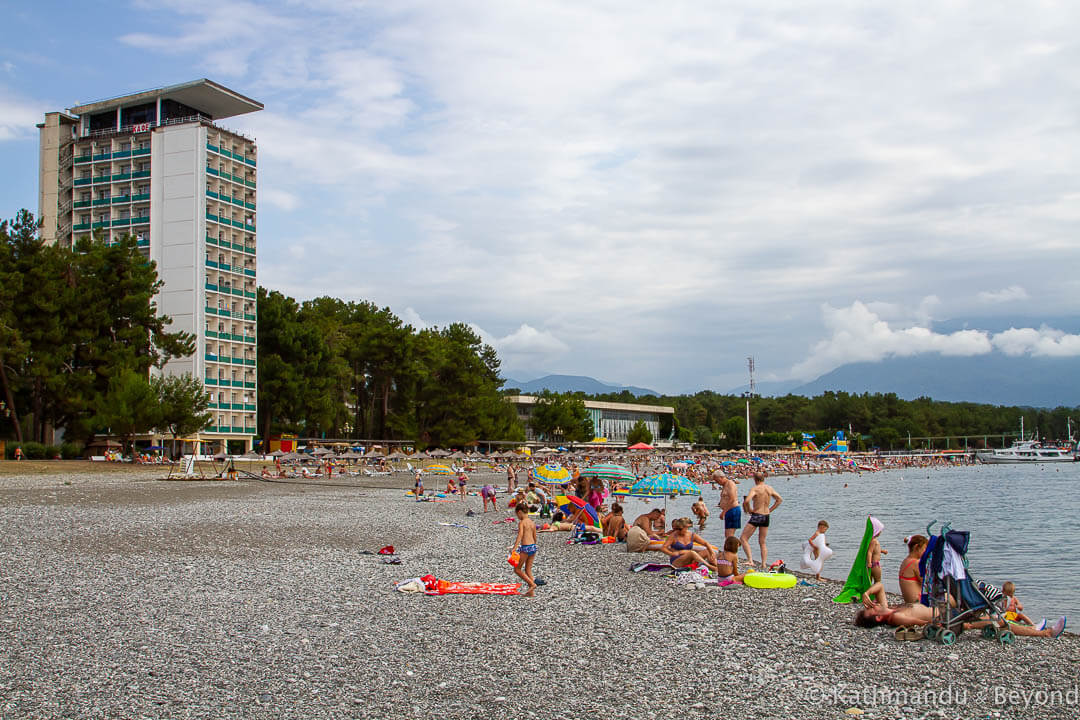
(Predominantly) Russian holidaymakers in Pitsunda
But, the atmosphere at Ochamchire was very different. The town also had a beach but there were only a handful of people sitting on it and none of them looked like tourists. The war affected the south of Abkhazia more than the north and everywhere we walked in Ochamchire, we were reminded of this fact. There were scores of derelict buildings on practically every road we walked down. On the beachfront, we entered a vast, abandoned hotel which, we were told, was due to open its doors about a week before the outbreak of the war. Two theatres lay in ruins a short distance away and we passed numerous private residences that were also in a similar state. Set back from the coast, we found more dilapidated structures, including a large factory that used to produce tea. But, the most striking place we came across was the railway station, a once-stunning Stalinist Empire style structure that was one of forty-odd such stations built in the 1950s and ‘60s throughout Abkhazia to accommodate the influx of tourists from all corners of the Soviet Empire.
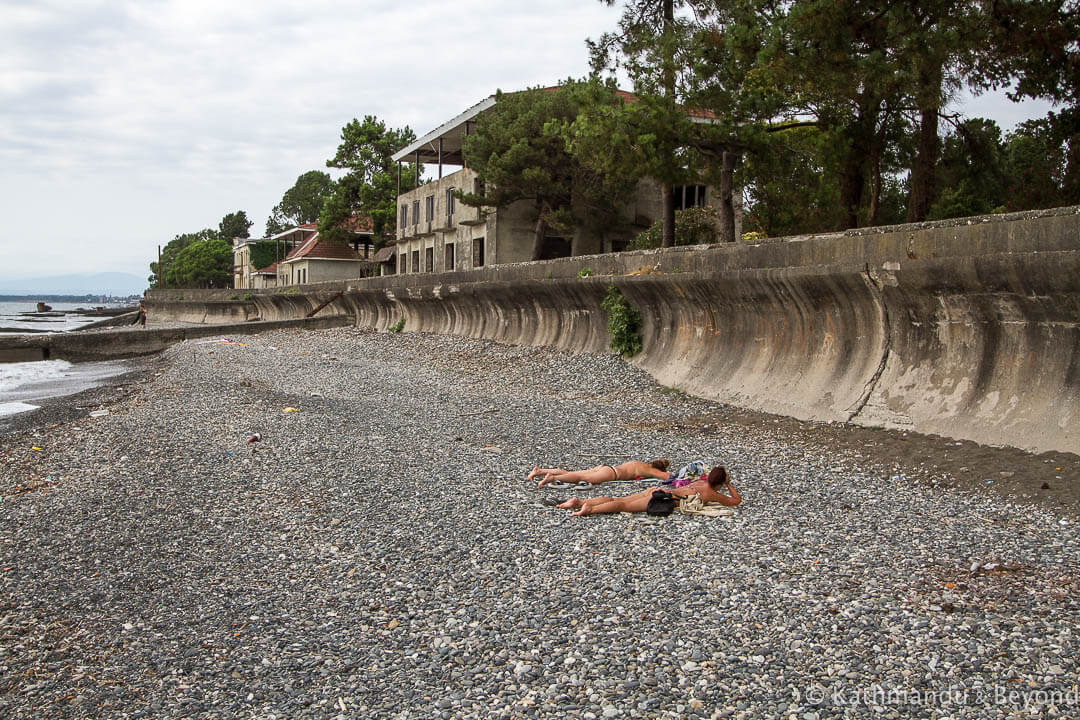
City beach in Ochamchire
Ochamchire felt desolate, especially as we had just come from the ‘all the fun of the seaside’ ambience of the coastal towns further north. I guess it didn’t help that the weather had turned. It was windy and overcast as we walked around Ochamchire and our initial impressions of the place were further compounded when two teenage lads approached us and asked us if we wanted to buy a ring, which one of them cautiously opened his palm to show us. It was obviously stolen. We declined but as soon as they worked out we were foreign, they pestered us more and even asked Kirsty if they could look at her phone. This was odd behaviour and the look about them wasn’t right. We walked off but they followed us for a bit, albeit at a distance, and only eventually went in another direction when I turned and gave them a “What the frig do you want?” type gesture. We didn’t think any more of it, however.
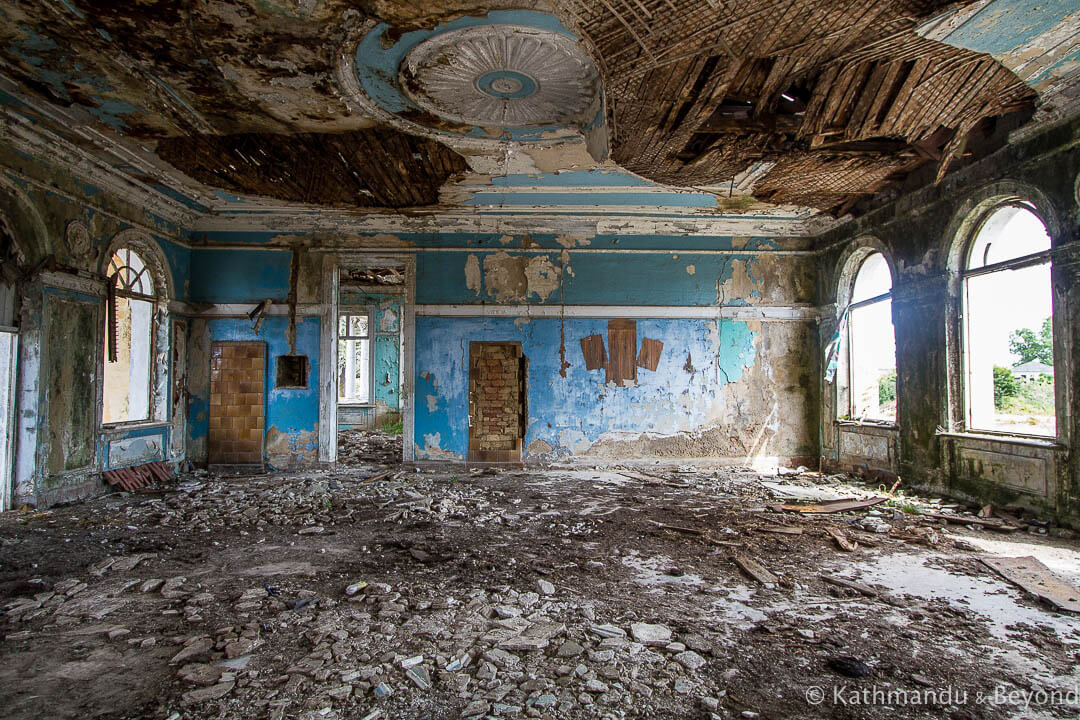
Interior of Ochamchire Railway Station
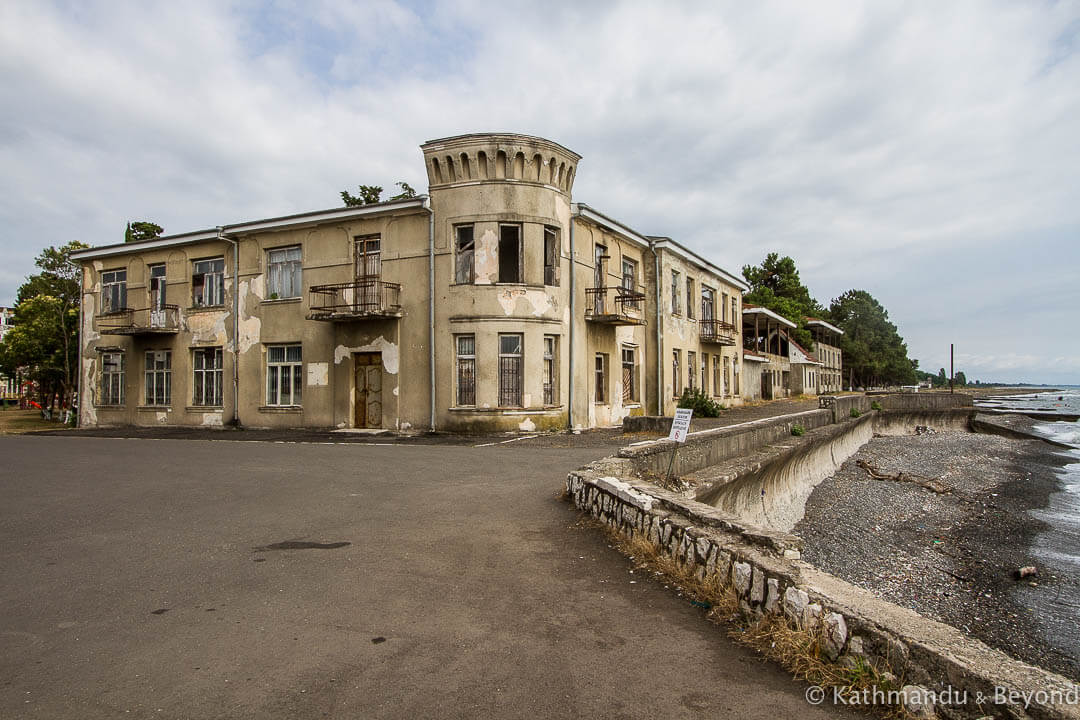
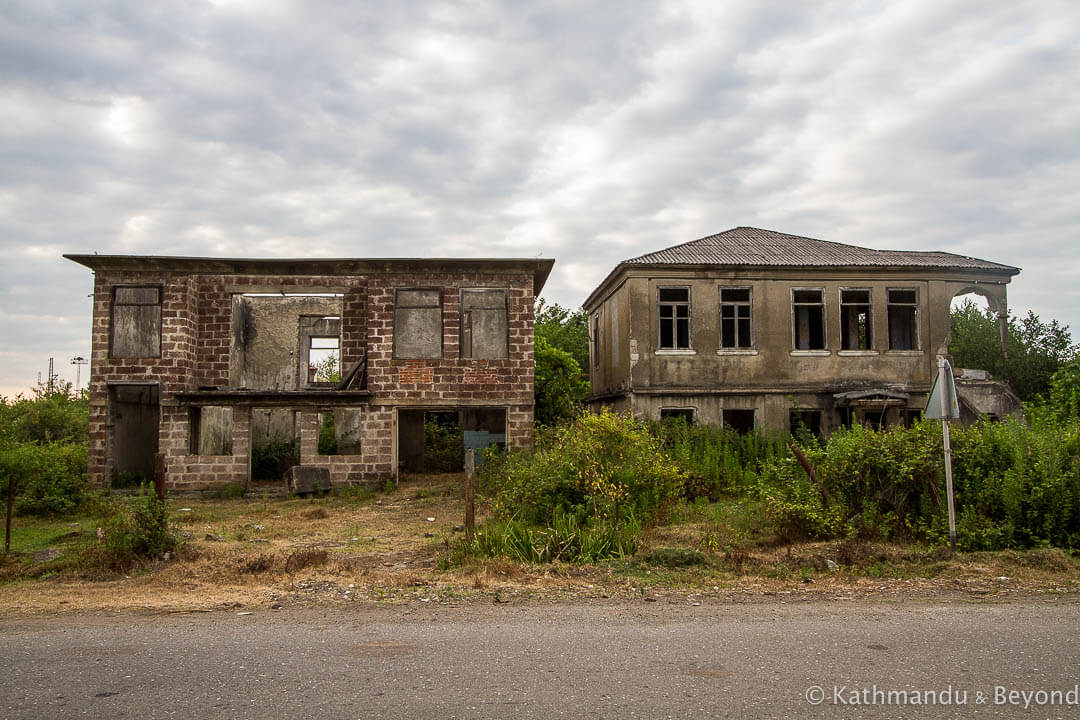
Ochamchire: the Promenade (left) and abandoned houses (right)
The next morning, we were about to leave our guesthouse when the owner, Miron (more on him later), who spoke good English, told us about an old mining town he was driving through en route to a waterfall he was taking some Russian tourists to visit. We hadn’t heard of the town but a quick Internet search revealed that Tkvarcheli, as it is known, was exactly the sort of place we were interested in seeing. It had been a prominent coal-mining town prior to the fall of the Soviet Union and many grand buildings, as well as a large section of the town’s thermal power plant, were in a state of abandonment. During the Abkhazian-Georgian conflict of 1992-93, the town was under siege for almost a year. The power plant was bombed in the early stages of the blockade and the town’s population had to live without electricity for the entire period.
We didn’t have time to check the security situation in the area and, to be honest, it didn’t occur to either of us to do so anyway. Up until this point, and not thinking any more about our interaction with the two lads in Ochamchire, we had felt perfectly safe in Abkhazia even though, in the past, the particular region we were in had had a bit of a reputation for lawlessness and gangsterism.
We made a spontaneous decision to go with Miron, particularly as he said he would be able to drop us off close to the border later in the day, meaning we would be able to continue with our plan to return to Georgia. For that reason, we had all our gear with us.
He dropped us in Tkvarcheli and we agreed a place we would meet up with him again three hours later. We left our main rucksacks in the car but took our hand luggage with us. This included our passports, bank cards and our stash of cash (mainly dollars), which we carry in a well-hidden pouch in case of emergency. Normally, when we are out and about sightseeing, we leave such valuables locked in one of our rucksacks inside our hotel room, or in a safe if there happens to be one.
We explored Tkvarcheli for about an hour and a half and observed a similar bleakness to the one we had experienced in Ochamchire. We made a beeline for the semi-abandoned factory where, on arrival, we got talking to some of the employees who worked in the functioning part of the plant. Football is almost as useful as an opening line these days as offering someone a cigarette and we discussed England’s chances of winning the World Cup through a series of gestures and the repeated use of the words ‘Harry’ and ‘Kane’.
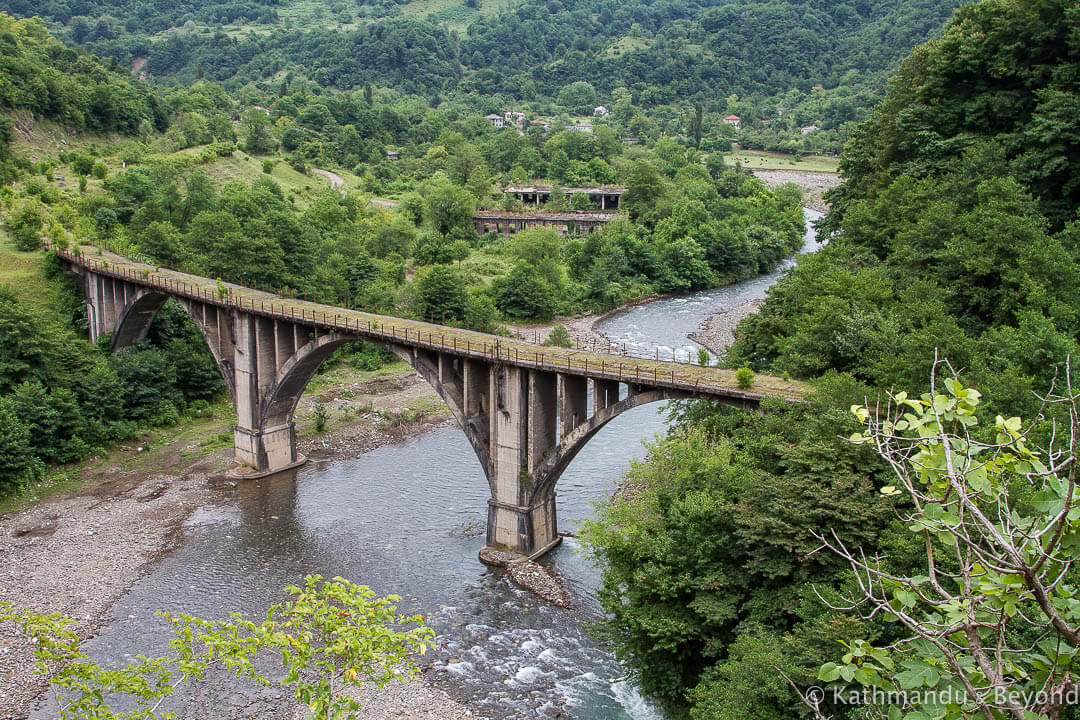
Tkvarcheli is surrounded by lush vegetation
They must have known that we were keen to look around the abandoned part of the factory because, after a short while, they pointed at our camera and asked us if we wanted to come inside and take photographs. They indicated to us that we were to stay away from the part of the factory that was still in use and told us which direction to head in. Without the pressure of potentially being somewhere you know you shouldn’t be, we rummaged around for more than an hour before returning to where they were all sitting. We thanked them, said goodbye and left to the chants of “Manchester United number one!” from a couple of the younger ones.
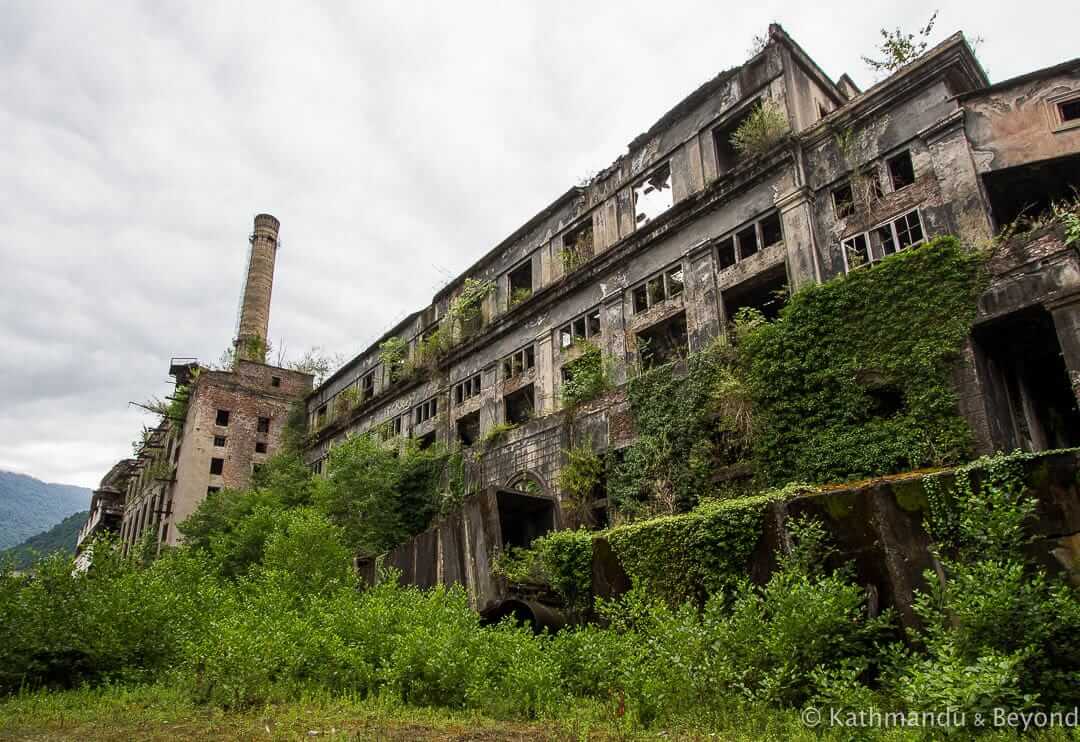
The abandoned section of Thermal Power Plant in Tkvarcheli
We then walked down the road to the derelict railway station and looked around there for a bit. At this point Kirsty commented on two guys she had spotted walking on the other side of the road, pointing out that, presumably, there wasn’t a whole lot to do in Tkvarcheli as it was the second time she’d seen them heading up and down the same stretch of road. I glanced at them but they were deep in conversation with each other and paying us no attention and so I thought no more of it.
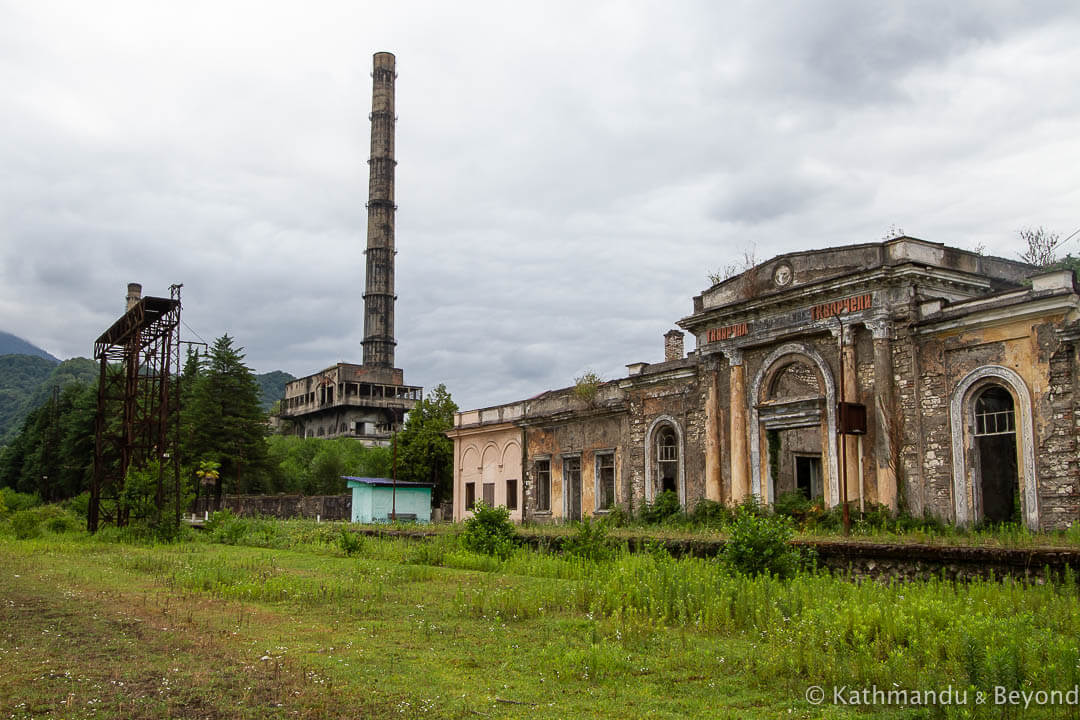
Tkvarcheli Railway Station with the Thermal Power Plant in the background
There was a disused cable car station opposite the railway station so we crossed the road to take a closer look. Suddenly, without warning, the two guys plus a third one were upon us and blocking our exit to the road. They were aggressive and shouting at us in Russian. We understood nothing except for the word ‘narcotic’ which they repeated over and over. From what we could gather, they were either accusing us of taking drugs or having them on our person. They wanted us to empty our bags. At first, we refused and tried to walk away from the situation but they became angry and started pushing me and grabbing Kirsty by the arm. It became apparent very quickly that they weren’t going to give up so, in the end, we did what they asked. To begin with, it looked like they were only searching for drugs, shouting the word ‘narcotic’ at us all the time. They had no interest in our phones, the camera or anything else in our bags. They even looked in our wallet, saw our roubles and handed it back to us.
They kept frisking us and then demanded that we show them our passports.
Abkhazia is unrecognised as a nation by almost the entire world, including the United Kingdom and, in plain English, without our passports we would have been fucked as we would have had no embassy/consular representation to help us out (*).
(*) Five United Nations Member States recognise Abkhazia: Russia, Nicaragua, Venezuela, Nauru and most recently, Syria. South Ossetia, Nagorno-Karabakh (both also in the Caucasus), and Transnistria (which borders Moldova) also recognise Abkhazia. The latter three also have status issues of their own.
This was the first thing to go through our minds, but it quickly dawned on us that our emergency stash of cash was also in the same location as our passports. We tried telling them we didn’t have our passports on us but they just frisked us and our bags even more thoroughly until they found them. Realising the potential seriousness of the situation, our attitude changed somewhat. Up until this point, we had tried to give an impression of calmness but the thought of having our passports taken away from us freaked us out somewhat. We pleaded with them. We even got angry back and shouted out for help but this pissed them off even more and one of them picked up a rock threatened us with it (*).
(*) The only comfort we got from this was the assumption that at least they weren’t carrying weapons as they surely would have got them out at this point if they had.
Eventually, they found our passports and the cash. One of them inspected both items while the other two held onto us, me via a hand in the chest, Kirsty by the arm and wrist.
So far, they had given everything back that they had inspected and, much to our relief, they did the same with the passports but the bag of cash was clearly too much of a temptation and the one doing the inspecting simply put it in his back pocket. We pleaded some more, somehow conveying the fact that we would have nothing left if they took all of our money (they had clearly forgotten about the roubles) and, for reasons we will never fathom, we were handed back two $50 bills and some of the Georgian lari.
We thought they would leave us once they had the cash but then they wanted to see the photos on the camera, especially those of the factory. Throughout, they were shouting at us, still using the word ‘narcotic’. What’s more, one of them made a humping and grinding gesture towards me and grinned while pointing at Kirsty. He then walked away from where we were all situated and shouted a command at the other two, who were still blocking our escape. This really scared both of us but, luckily, the one who had walked off came back seconds later and the situation didn’t develop further. He then said something else to the other two and, without warning, he and one of the others left while the remaining one prevented us from moving. After a few seconds more, the final guy gestured that we should stay where we were and suddenly he was gone as well. I saw him run off and get into a car a few hundred metres up the road but he was alone and I don’t know in which direction the other two went.
We walked to the safety of the main road, gathered ourselves and our things and then walked to the centre of the town. The whole incident must have lasted about twenty minutes.
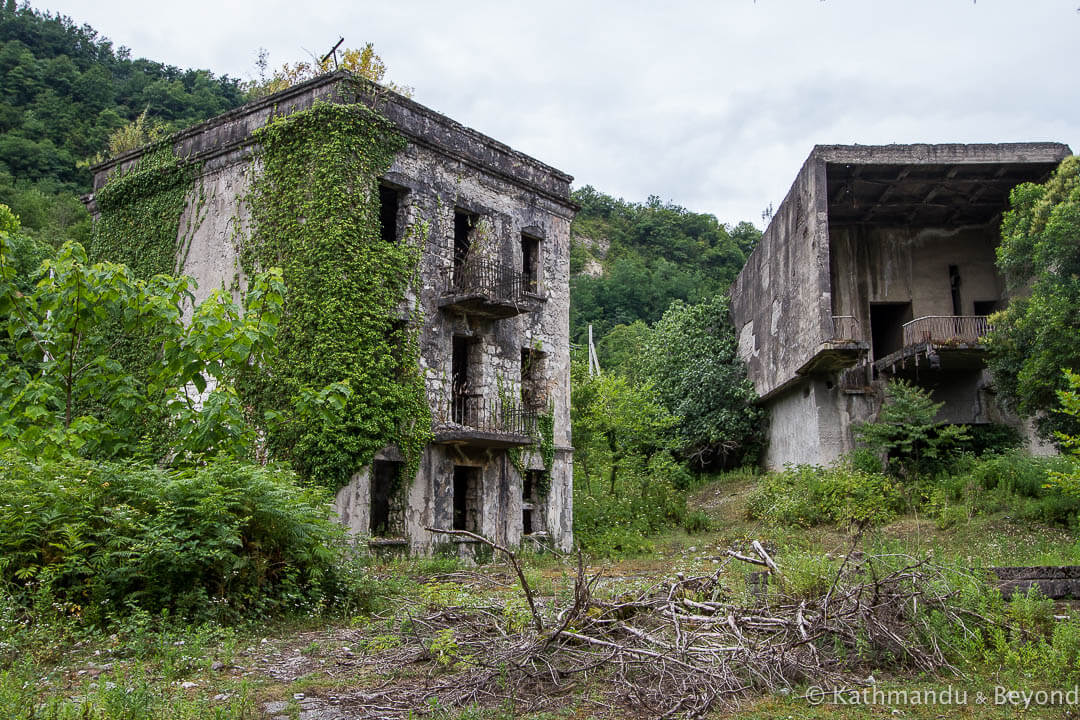
Disused cable car station (right) in Tkvarcheli
This is only the second time anything this serious has happened to us in, what will soon be, ten years of full-time travel (*). In fact, it’s the worst thing to have befallen either of us while travelling, either together or on separate trips.
(*) The other occasion was in Ukraine when a guy started to come towards us with a knife. He was as high as a kite and luckily his mate saved the day by stopping him in his tracks and we were able to make a hasty retreat.
We had about an hour to kill before reconnecting with Miron and the Russian tourists but he had pre-warned us that he might be late and it wasn’t until two hours later that we were in the car, telling him what happened.
Miron was shocked and horrified, even to the extent that he blamed himself. In fact, if there is any positivity to come out of this story it’s the genuine empathy and support that Miron showed us in the aftermath of the event. He didn’t charge us anything for the transport. He also put us up for an additional night (we didn’t want to cross the border late in the day after what had happened) and fed and watered us. He knew we still had some roubles on us as we had told him, plus, we could have gone to an ATM and drawn out more. We tried to insist that he took at least some of our roubles as part payment but he outright refused. When we were back at the guesthouse, he even wanted to go to the local store and buy us some beer, although I declined his offer as I’d made it my priority the minute we got back to go out and buy some as we were both in desperate need of a drink.
Miron’s kindness was the only part of the whole encounter that reduced Kirsty to tears.
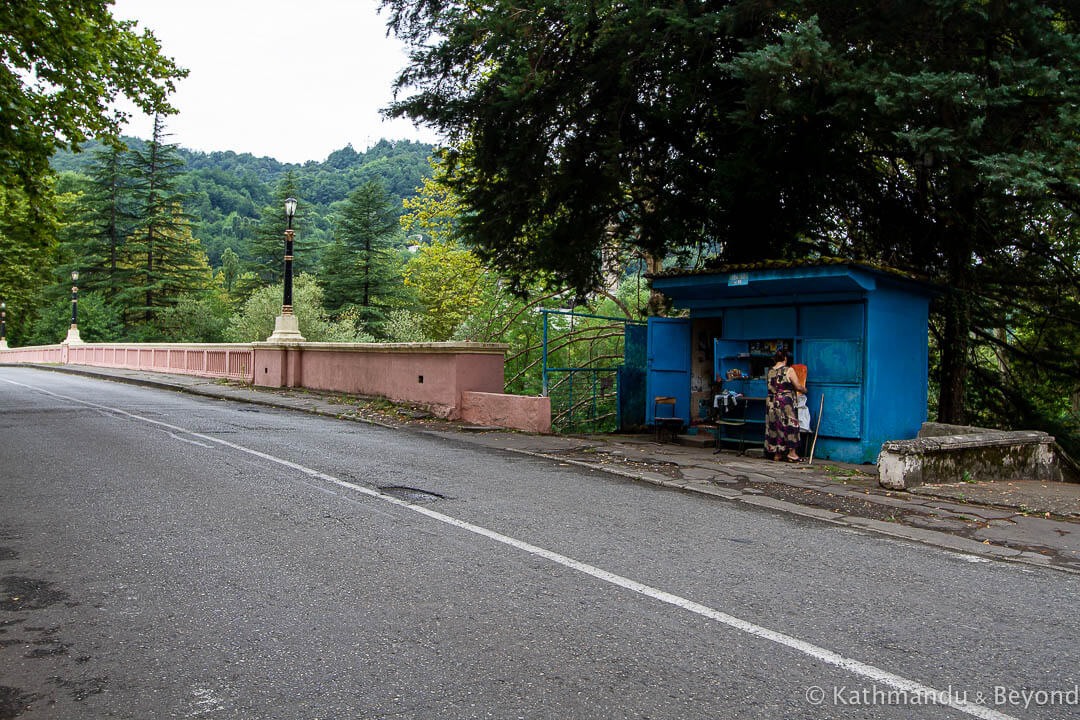
We didn’t get much of a chance to take many general shots of Tkvarcheli. Like in other former Soviet cities and towns, the bridge in Tkvarcheli was built by German POWs, captured after World War II
Do we count ourselves lucky?
I guess we do. Kirsty had a few bruises on her arm from where they were gripping her but neither of us was physically hurt and the unspeakable, which flashed through our minds for a minute or so, never became a serious threat. What’s more, we managed to hold onto our bank cards, phones, camera and, most importantly, our passports. The thought of being without the latter in a country where we would have had zero consular support still makes both of us feel sick in the stomach.
Ultimately, we only lost money – $500, €80 and some other odds and sods in various other currencies and we are grateful for that. As I’ve mentioned, normally we don’t have that sort of cash on our person but perhaps even that was a blessing in this instance as it ultimately seemed to satisfy the criminals enough to leave us alone.
But, not long after the event, the sense of relief and good fortune that it could have been a lot worse, was overtaken by a barrage of other thoughts, of which the most overriding one is a sense of hatred for the perpetrators. It didn’t take me long to wish them a slow and painful death but even Kirsty, who rarely wishes ill on anyone, admitted that she would like something unpleasant to happen to them. If they were drug users (see below) then, with luck, they spent all the money on one massive blowout and hopefully overdosed as a result (*).
(*) That last statement is all me. Kirsty isn’t that vindictive!
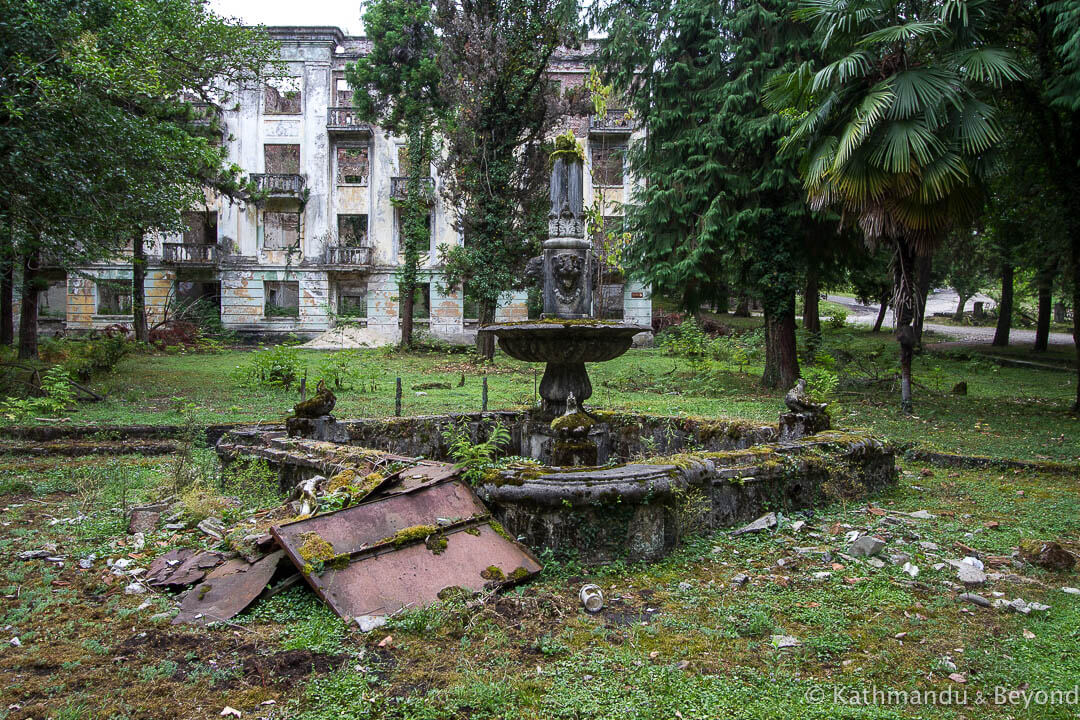
Tkvarcheli
There’s also all the unanswered questions. Back in Georgia, sitting there with a beer, the conversation for quite a few nights thereafter was dominated by us trying to analyse who these guys were and what they were saying/accusing us of.
How did they manage to creep up on us without any warning whatsoever? Had we been set up by some of the workers from the factory? Why didn’t they take the camera, our phones or the roubles, for example? Or why not simply just take both bags and their entire contents? And why give us some of the cash back? Of all the unanswered questions, this last one is the one that has bugged us the most.
Miron believes they were either drug dealers or gangsters and that we had stumbled upon their drug den. We are not so sure. We didn’t notice any drug paraphernalia on the floor (we instinctively look for this sort of thing on the ground and steer clear if we spot it) and, what’s more, they didn’t look like drug users in both their appearance and the way they behaved.
Another possibility is that they were plain-clothed policemen (or even KGB). They used the word ‘police’ every now and then, saying “niet police” (“no police”) but the meaning is open to interpretation. They didn’t show any signs that they were carrying weapons and at no point did they show us any identification. Being police would explain the obsession with looking for drugs and possibly why they gave us back some of the money and didn’t take anything else. But it’s not very plausible and, what’s more, why no weapons? – the police in this part of the world nearly always carry guns and they aren’t shy when it comes to letting you know about it.
Another weird thing was, when we crossed back into Georgia the following morning, both us and our bags were heavily scrutinised by the police on the Abkhazian side of the border. Two other travellers, who arrived shortly after us, were ushered through unhindered. Again, we were questioned about drugs and also specifically asked if we had visited Tkvarcheli, which was a unusual question given that hardly any foreigners visit the town. We told them, via a translator who had been called over, that we had visited Tkvarcheli. We then, rather hesitantly (we didn’t trust them) told the police what had happened to us there. We were hoping to get a police report in order to make an insurance claim (see below) (*). We’d had no luck up to this point and we also got zero assistance or sympathy from these policemen either. In fact, and whether this was paranoia or our overactive imaginations kicking in as a result of what had happened the previous day, we both got the impression that a couple of the policemen smirked and gave each other a sideways glance as if to say, “Ah, that’s them then!” when we told them our story.
(*) We did eventually get a police report. Miron, being pragmatic about the whole Abkhazia/Georgia situation, suggested that we contact the Georgian police when we arrived at our next destination and file a report with them. Initially, we dismissed this idea but, to Georgians, Abkhazia is part of their country and so we decided to give it a shot. We dialled 112, the Georgian equivalent of 999 or 911, and within twenty minutes we were being picked up from our guesthouse in Kobuleti (much to the initial distress of our landlady!) by two uniformed policemen and whisked off to the city’s main police station, which was about 10-minutes’ drive away There, an interpreter was called and, after four hours and lots of questions, a full statement was produced and we were presented with the report we needed to pursue our insurance claim. The Georgian police were polite, professional and even drove us back to our guesthouse later that evening. If we could give them a good review on TripAdvisor we would happily do so!
We also analysed our own behaviour. We were both in a highly stressed state but Kirsty showed it less than me. She was more practical, taking out a shopping bag at one point, for example, and asking the gang if we could place stuff in it after they had inspected and discarded (rather than putting it on the floor as they had wanted to do), to which they agreed. This would never have occurred to me and we would have probably lost some things because they would have been strewn all over the ground.
I wasn’t especially proud of the way I behaved. I always imagined that if I was ever in such a situation I would either escape or fight my way out of it and that the perpetrators would get away with nothing or, better still, would limp off after I’d kicked them in the bollocks. Instead, I pleaded a lot, panicked somewhat and, overall, wasn’t particularly manly. Of course, there were three of them and I’m no Rambo but my behaviour during the course of the mugging did keep me awake at night for a little while thereafter as I’m sure it did Kirsty albeit for different reasons.
We don’t need therapy (British stiff upper lip and all that …) but, what happened has made us pause for thought.
We’re also aware that what happened is partly our fault. Urban exploration is not without its risks and we know that. Rundown areas, undesirables, aggressive dogs as well as all manner of safety risks are but a few of the challenges that need to be taken into consideration. In the particular case of Tkvarcheli, the town is desperately rundown and its townsfolk have witnessed unthinkable hardship in recent years. Many of Tkvarcheli’s population no doubt suffer a poverty-stricken existence on a daily basis and probably don’t appreciate voyeuristic tourists wandering around and taking photos. Taking the robbery out of the equation, we didn’t receive any other hostility from the locals during our time in Tkvarcheli but you don’t know what’s going through their minds when they see people like us wandering around their hard-up town treating it as if it’s a tourist destination. Even though we are generally discreet when we visit such places, we know we stand out like a sore thumb and will eventually attract attention.
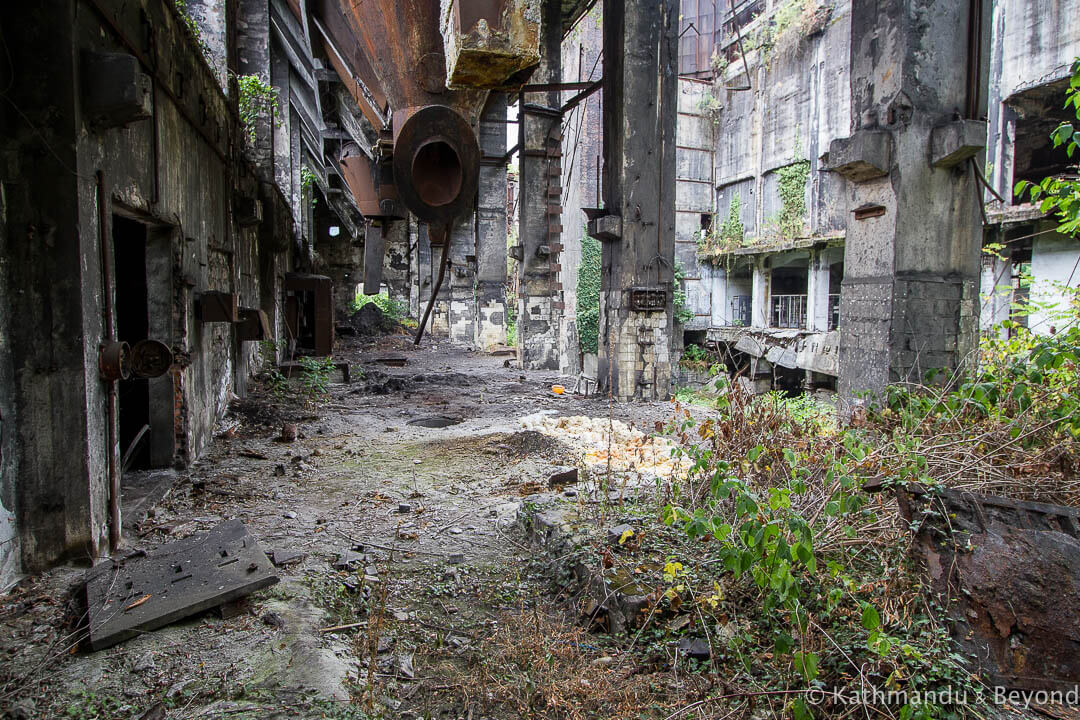
Inside a disused part of the Thermal Power Plant in Tkvarcheli
What happened hasn’t put us off completely from visiting similar places in the future. Our imminent plan, one which we devised a long time before we visited Tkvarcheli, is to stop travelling (famous last words!) for at least a couple of months. We want to rest and we want to work on our blog so, by default, such places will not be on our radar screen anytime soon. But, it will certainly be with an air of extra caution, when we do finally get back on the horse.
To end the story, eventually, we arrived back in Georgia and, as we were driving away on a marshrutka (fixed route minivan) bound for Khobi, our next destination, the song blaring out from the radio was the ‘80s classic When the Going Get’s Tough Now by Billy Ocean. We turned our heads and gave each other a nervous smile …
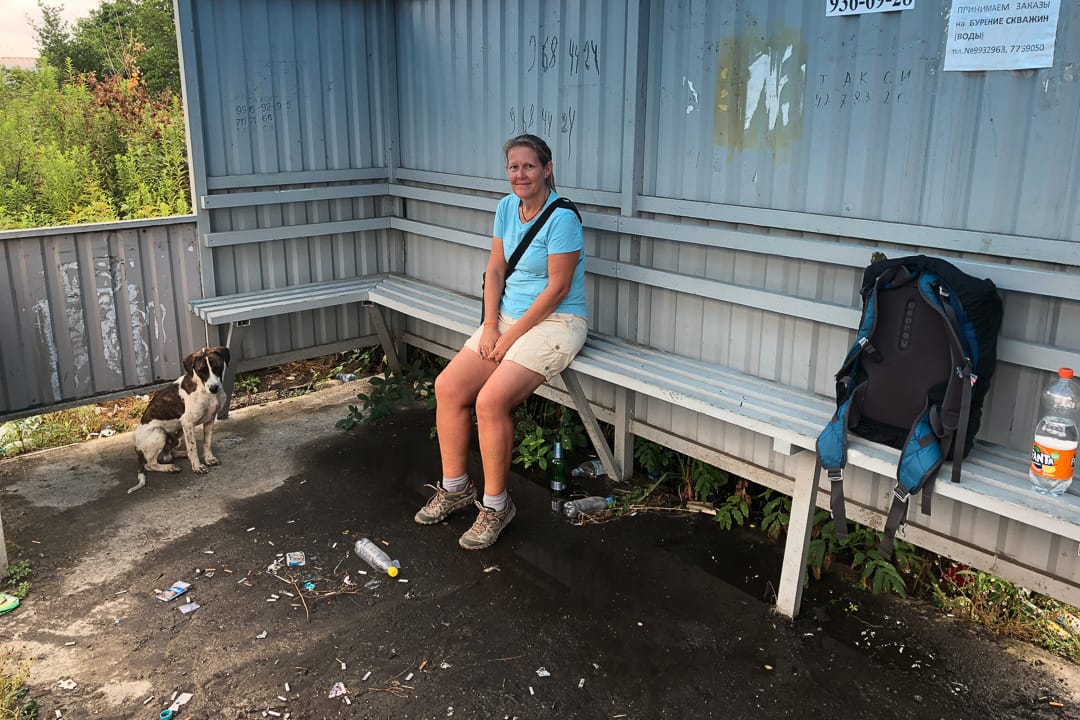
The morning after the day before … waiting on the outskirts of Ochamchire for a marshrutka down to Gali and onto the border. I’m not sure who looks sadder, Kirsty or the dog!
And one final plus to come out of all of this. At least we now have a decent story, which we can recount when in the company of other travellers. So often, the conversation turns to bad experiences on the road and, up until this point, we’ve never really been able to join in!
Would we return to Abkhazia?
Probably not is the answer but our decision is not based on what happened to us in Tkvarcheli. Generally, we felt very safe during our ten days in Abkhazia. Our decision not to go back is down to the fact that we feel we have seen everything we want to see and don’t feel the urge to return.
What’s more, and it’s no doubt the paranoia kicking in again, but another reason we are unlikely to ever return to Abkhazia is that we feel our cards have been marked by the authorities. The whole business with the border police on the day we left was very odd indeed and we are convinced they were somehow in the know about what happened to us.
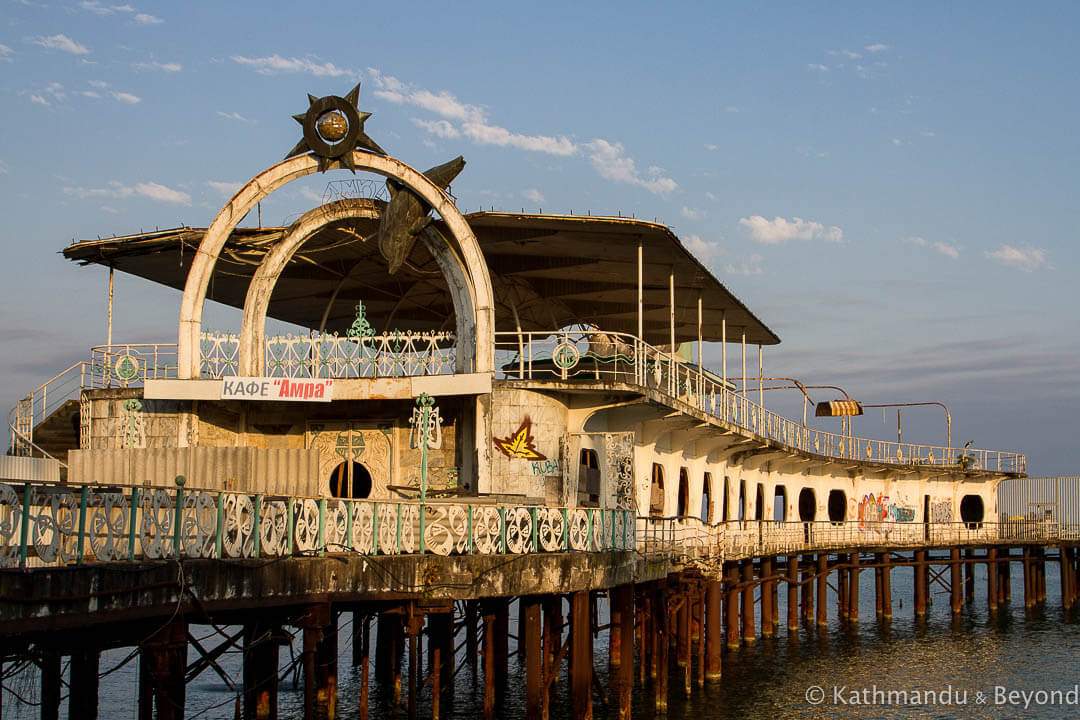
Late afternoon light on Amra Pier in Sukhumi, a small but friendly city which we instantly took to
Should you go to Abkhazia?
If we had returned from this de facto state unscathed, the straight answer would have been yes to this question. It is a fascinating place to visit, especially if you are interested in the recent history of the Caucasus, Soviet architecture and/or into glorious scenery. But, we learned a valuable lesson about risk and worst case scenarios if something does go badly wrong while we were there and our advice would be to know the facts before making the decision to travel there or not.
From a travel advice point-of-view, we look at things from a British standpoint and there aren’t many places in the world where we would have absolutely no embassy assistance, either from our own consulate or that of another country with whom the UK has a reciprocal agreement.
If you look up Abkhazia, which is lumped together with Georgia’s other breakaway state, South Ossetia, on the Foreign and Commonwealth Office (FCO) website you will see the following statement:
The Foreign and Commonwealth Office (FCO) advise against all travel to the breakaway regions of South Ossetia and Abkhazia, and against all but essential travel to areas near the Administrative Boundary Lines with Abkhazia and South Ossetia.
The British government doesn’t recognise the unilateral declarations of independence made by the de facto authorities in Abkhazia and South Ossetia. There is no UK diplomatic representation.
It’s blunt and to the point.
We, of course, read this before we went but chose to ignore it. Like many, we assume it’s never going to happen to us but, in this instance, it did and the pile of crap we would have found ourselves in had our passports been taken from us, would have been above waist deep.
I often lament about the lack of assistance a British embassy or consulate can offer the traveller these days (British nationals can’t even renew a passport in Asia, for example, without it being returned to the UK) but it’s reassuring to know that they can still issue an emergency travel document and help get you out of a fix if necessary.
It is generally considered that currently, the three most dangerous countries in the world are Syria, Afghanistan and South Sudan. There is a British embassy in each one of them. It would have taken a lot of effort, grovelling and probably some backhanders, as well as an element of luck to have sorted out a problem of this magnitude, i.e. a lost or stolen passport, in Abkhazia. Not only would leaving have been problematic but I suspect the Georgian authorities wouldn’t have been best pleased or that willing to help either (*).
(*) Although, based on our positive experience with the police in Kobuleti, perhaps my assumption is not correct in this instance.
Either way, it’s going to be a real headache and very stressful if you lose your passport in Abkhazia. We did read later that the Red Cross in Sukhumi might have been able to help in such an event but there’s no guarantee of this.
Then there’s the issue of insurance. Practically all insurance companies the world over take the advice of the FCO (or a country’s equivalent organisation) as their benchmark for where is and where isn’t covered geographically. Given that the FCO, for example, categorically advises against all travel to Abkhazia, it’s highly unlikely a regular insurance policy is going to cover you for a trip there.
In our case, we don’t yet know the outcome of our insurance claim. We have been honest with our provider as to where the incident took place and supplied them with everything they need. I suspect, if they are savvy enough, they will reject our claim. If this is the case, we won’t argue. We can (just about) afford to write off the cash that was stolen but had we needed expensive hospital treatment as a result of the incident then, yet again, we would have been screwed and that’s an uncomfortable thought to have lingering around in your head (*).
(*) As an aside, and I mention this because of the insurance thing, don’t take any risks crossing the road in Abkhazia. The Abkhazians, like others in the region, drive way too fast and show very little respect for pedestrians.
It’s not our place to say whether someone should go to Abkhazia or not, but our tale is a cautionary one, which could have resulted in a much nastier outcome and, although we appreciate it could have happened anywhere in the world, if it had taken place elsewhere, we would have had the assistance of our government and more than likely we would have also been covered under our insurance policy as well.
If you do decide to visit Abkhazia, or anywhere else considered high risk (including other partially recognised states), look into taking out specialist insurance to cover you for the trip. It’s not something that we’ve really thought about in the past but, there’s nothing like a tough lesson to make us change our minds going forward. This post by Against the Compass provides some sound advice and recommendation about companies that offer insurance for high risk destinations.
What’s more, if you want to spend time in Ochamchire (and visit Tkvarcheli) then we would recommend staying at Miron’s guesthouse (Resort on Papaskiri 76). It’s a good place to stay and he can also help out with advice and transportation if required.
And last, but by no means least, it goes without saying that you should take extra care of your passport if you do visit Abkhazia (or any place without consular support). Not once were we stopped and asked to show ID while we were there so there’s no need to carry your passport around with you all the time. In our opinion, it’s better to keep it locked up in a hotel room rather than have it on your person because, if you lose it, you really will be up the proverbial creek without a paddle!
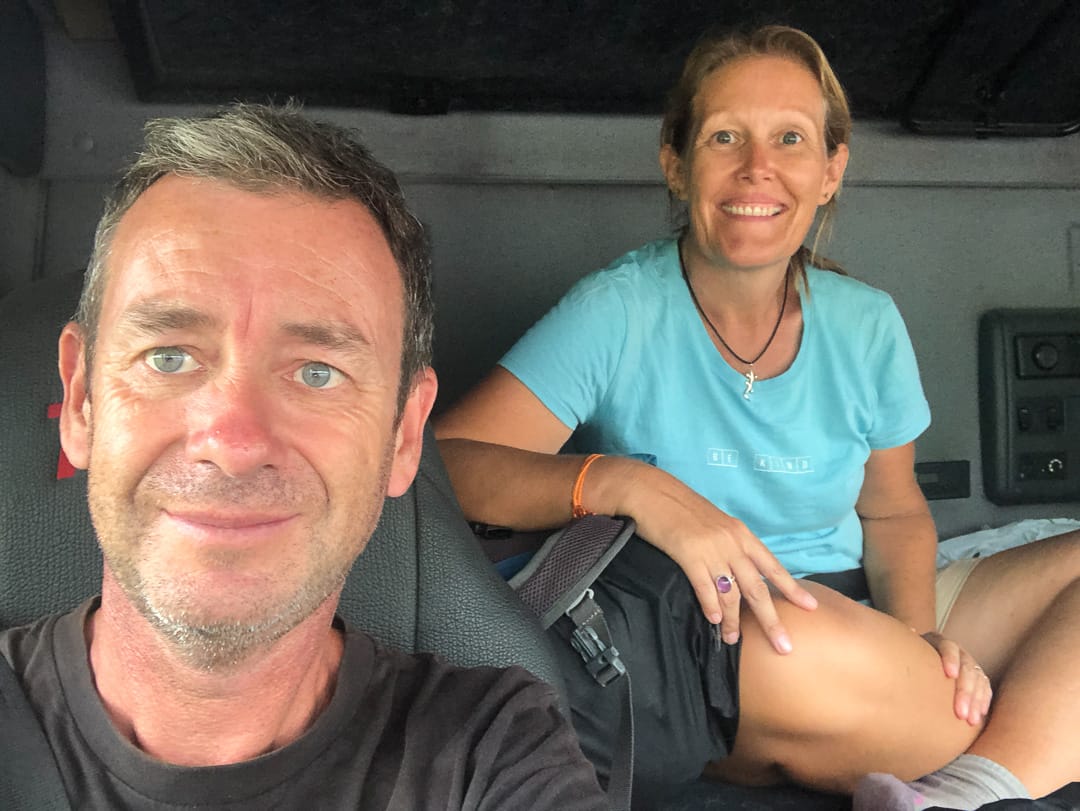
The afternoon after the day before … we are back in Georgia and travelling by truck from Kobi to Kobuleti (that’s why Kirsty has got her shoes off – truck drivers always ask you to remove your shoes before getting on their bunk, which is fair enough!). I was originally going to title this blog Good triumphs over Evil (EVERY TIME) because, the number of decent and kind people we have met on our travels outweighs the number of bad ones by an infinite amount. We weren’t even hitching when the elderly guy driving this truck pulled over and offered us a lift and we’ve had numerous experiences like this one throughout the entire region. Don’t let the above put you off: the Caucasus and its people are wonderful!
PLEASE PIN THIS POST…
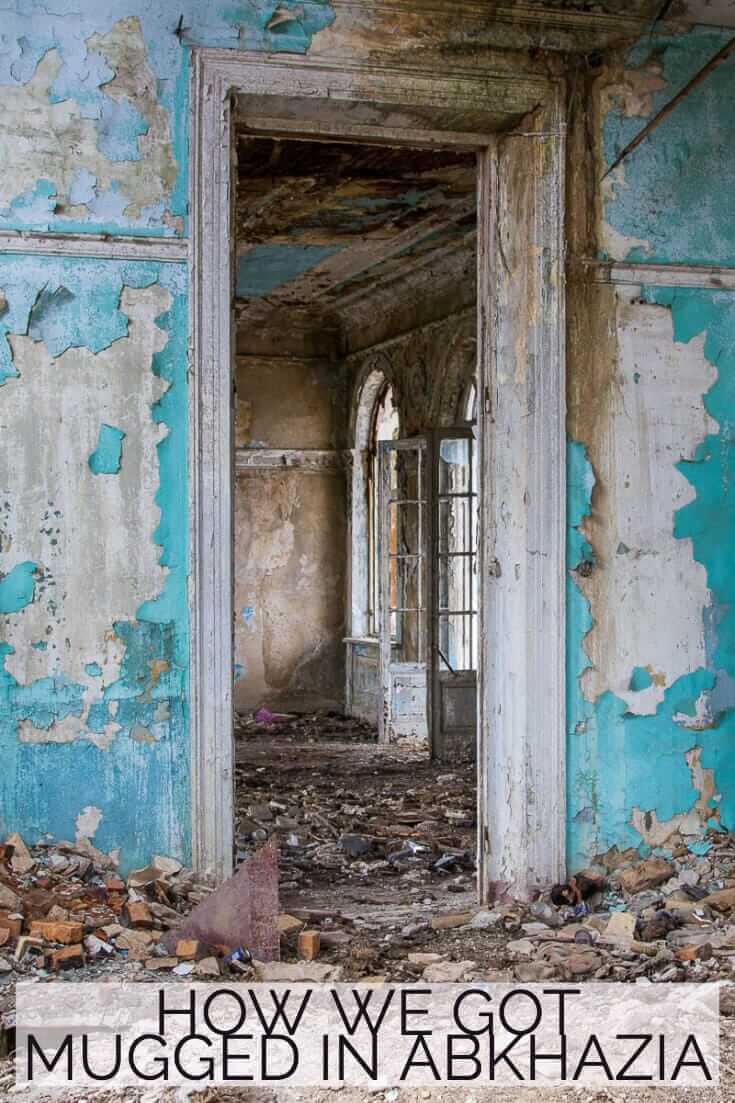
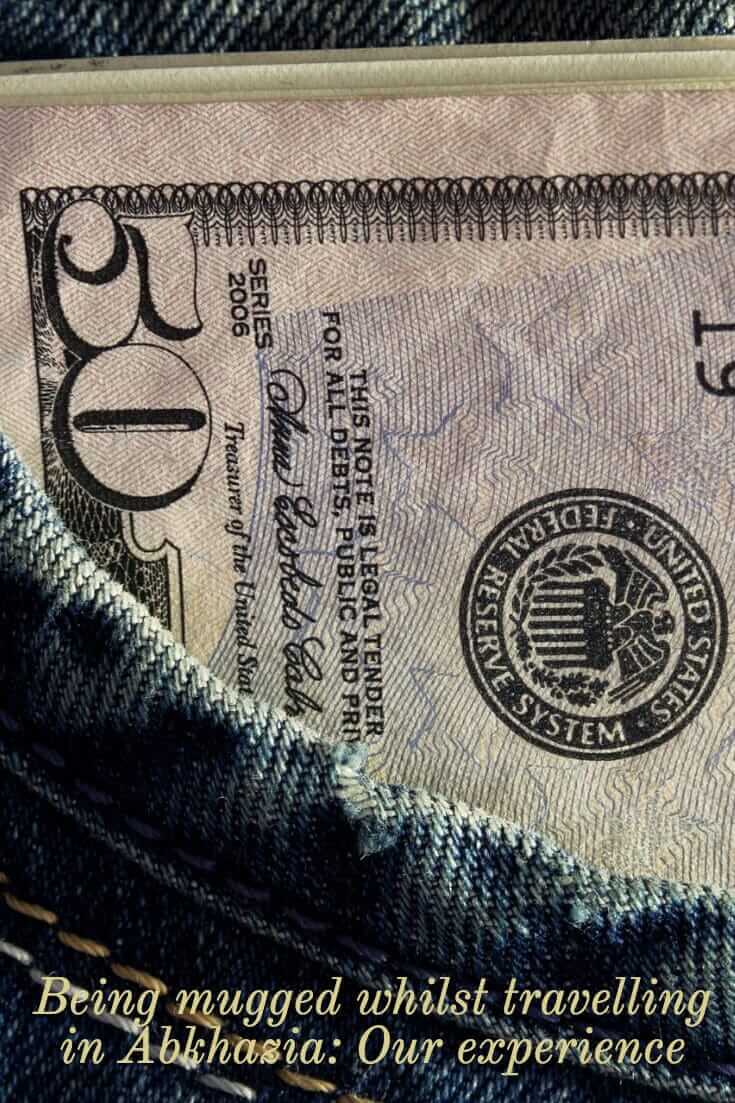
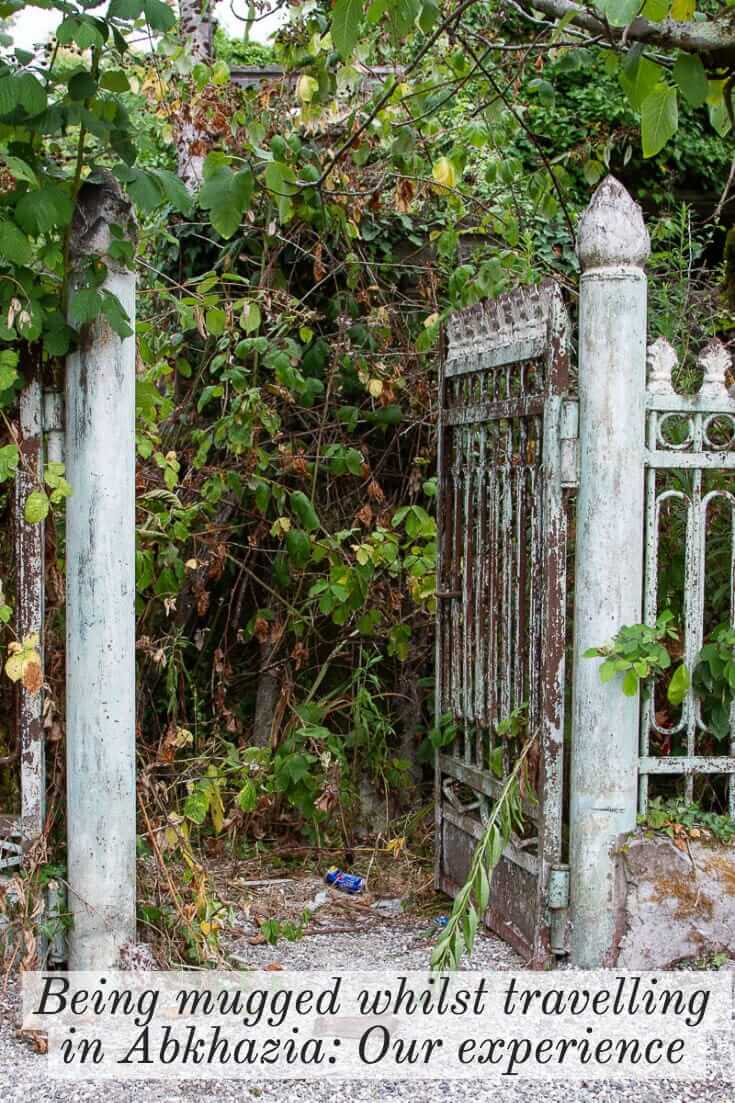
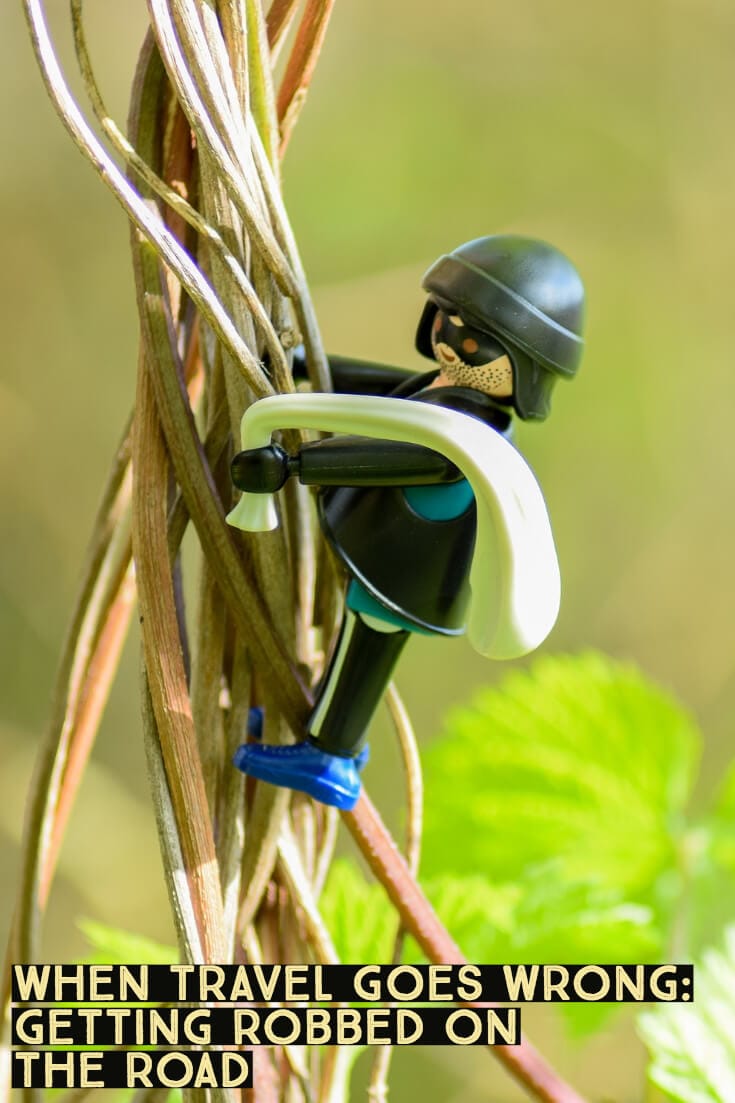

Mark and Kirsty – we are really sad and sorry to hear about your experience. That is just about the worst travel nightmare possible and just reading your account makes us more wary.
Hmm, you know how you should never believe in coincidences? Maybe someone at the factory tipped off a friend in the “police”. Splitting that kind of money is good business…
So sad seeing that photo of Kirsty with the dog. Dogs really feed off energy and that dog is feeling it.
You said it – things can happen anywhere. I lived in Montreal 25+ years and had a few very scary things. But anyone would be stupid not taking a lesson from this, the main one being to be very careful if you’re somewhere without diplomatic assistance. And to always protect your passports.
Again, so sorry and feel for you guys.
Thank you for your concern Frank, it’s appreciated. It wasn’t a good day, that’s for sure. As I said in the post, we analysed what happened for quite a few days thereafter (it was a good excuse to drink beer :-)) and we just aren’t sure about the factory workers – I really am on the fence about it, they were friendly enough but I know that means nothing!
As you say, the whole consular assistance is the thing to take away from all of this. We nearly didn’t write the post at all because we knew this before going there and, of course, ignored it. We should know better at our age!!
So sorry to read about your experience, have to admit I may have had a tear in my eye reading it. It’s a difficult thing to share, but I think it’s so important that stories like these are shared. Real travel isn’t the glossy instagram feeds that we see everywhere (at least not all the time anyway), it’s (unfortunately) incidents like this too, and people need to be aware of the dangers as well as the positives. Just glad you’re both okay (at least on the surface) and that this won’t stop you doing what you love doing. Enjoy your ‘rest’, you deserve it!
I love what you’ve written Heather, it’s bang on the money! We felt a bit stupid for being caught in such a situation in the first instance but felt it was almost a ‘duty’ to share it with others as we certainly didn’t think about the consequences of loosing our passports in such a place before heading there. We are going to start writing some travel-related posts about Abkhazia soon as really did enjoy our time there despite what happened!!
Sorry to hear about that, but glad it wasn’t worse. You deserve a couple of months resting in the south of France!
Thanks Doug! It’s actually the east of France (near Geneva) but who’s splitting hairs – we certainly aren’t!!!
Guys this is SO tough. Stuff can happen anywhere; we never know, really, because my wife and I have been in many desolate areas with only a few locals around and haven’t had anything happen. Sometimes a few desperate folks take a huge risk and do stuff like this. Because some tourists physically fight, or maybe yell, and only the most insanely corrupt cops or genuinely crazy locals fight back or continue to rob. You guys handled it really well. I believe only the super detached or enlightened would not feel any fear in such a situation. I reckon anger would arise in me, followed up by handing over money and just letting it go, even though I’d have been pissed for hours. Thanks for sharing guys.
Ryan
Thanks Ryan. Accepting it was inevitable doesn’t make it any easier but like you we’ve gotten away with being in plenty of desolate places with no bad outcomes for a long time now!
So glad to read that you are both OK, that’s the most important thing! And as you say, now you have a story to tell.
Thanks Barbara. Yes we feel a bit like we’ve finally earned our ‘traveller stripes’! Although that’s enough of a story to tell – I don’t need any more nasty surprises! Hope your summer travels are treating you well. 🙂
First and foremost, you got out of this predicament alive and mostly unharmed. Hopefully, there will be no lasting effects but valuable life experience. I love exploring ruins and always trying to incorporate this type of experience in our travels. Hence, I am glad that I read your post – you provided some valuable food for thought about some things that are too often get overlooked or discarded as not that important (i.e., insurance and assessing the situation on the ground). Being the first-hand encounter makes this reading even more powerful. Couple years ago (summer 2016) we spent 3 months in Georgia. Due to some issues with my papers (somewhat long and muddled story unrelated to this topic), we had to skip already planned visit to Abkhazia. It was always my biggest regret about that trip. After learning about your ordeal, I am not so sure anymore. Wishing you all the best and looking forward reading your less blood-curdling adventures. Cheers!
Thanks Elena, and thank you for taking the time to comment. It made us realise that especially as experienced travellers, it’s easy to become a bit blasé about some of the potential risks.
If you do get the opportunity to visit Abkhazia, it’s still worth considering – we would just suggest avoiding the southern parts and to be extra vigilant. As you have experienced, most of the Caucasus is very safe, and we have hitched a lot in Georgia and Armenia, but I would think twice about doing so in Abkhazia for example. As you say, we were unharmed and hope it won’t put us off urban exploration in the future! Thanks again! 🙂
I’m so sorry to hear this!! What a different world do they live in…
Thank you. Yes, you are right that their world is very different, and that was probably the problem… 🙁
I’ve always wondered, without wanting to know the answer, how I would react in a situation like that. I’m so glad you made it out OK and with your passports. Happy Future travels
It’s always been something we have thought about also but didn’t think it would happen in this part of the world. Thank you for the good wishes, we are looking forward to our future travels!
Why were you carrying so much cash?
Because, as we mentioned in the blog, we had everything with us as we were on our way back to Georgia. You need to carry quite a bit of cash with you in Abkhazia as there aren’t many ATMs.
Hi Kirsty and Mark…I can’t begin to imagine what you went through and thankfully, you both walked away. I’m stunned about the passports and return of cash, as well. I agree with your assessment of the border guards and the other stories from fellow travelers. That’s really too bad as you both could have turned this area into a more visited place. Again, I’m glad you both were able to walk away from this and write of your “adventure.”
Thank you for your kind words Susie. We’ve subsequently figured that, by returning the passports, the robbers were gambling that we wouldn’t make a fuss and instead make a quick exit from the country. And they were right but, the whole returning some of the money thing continues to perplex us, especially as they gave back such a sizeable chunk of it! We still have fond memories of Abkhazia, despite what happened, and intend to write some travel-related posts in the near future. We are still catching up with posts about Asia, which was earlier in the year so it may take a while, however!
Hi. I read both encounters of yours and another traveler’s. They were horrifying. Glad you guys are okay now. I found your link from the Tripadvisor forum. I just returned from Gerogia, It is a paradise for urban exploration lover ( Chiatura and Tskaltubo,). And i can say Abkhazia is even more gritty and fascinating in scale from your pics & internet source. But i guess i have to think this through if i ever plan to visit Abkhazia. Thanks for sharing your experience and warning!
Rick, Malaysia
Thanks Rick. It was a bit of a shock at the time, but we are OK now. You’re right about Georgia and Chiatura and Tskaltubo are also among our favourite places there! On our latest trip, we went back to Tskaltubo two days in a row because we loved the abandoned sanatoriums so much! https://www.kathmanduandbeyond.com/abandoned-soviet-sanatoriums-tskaltubo-georgia/
At least there are no ghosts in abandoned buildings there whereas in most parts of Asia we are warned the abandoned buildings are haunted! 😉
What a horrible experience. Thank god nothing more serious happened to you. Just one little thing about the passport: While it is true that you cannot get any consular help when you run into trouble in Abkhazia or other regions which are not recognized. But as long as it is only a lost passport, most countries would still try the best to help you. In your case I would asume that the British Embassy in Tbilisi would issue new documents and send them somehow to you, Thats what I heard some years ago in a similar story. After all they cannot let you rott there, right?
Thank you for your kind words and you make an interesting point about the passport. Luckily we weren’t put in a position where we had to find out but I agree with your point that it is in nobody’s interests to have you stranded and I include the Abkhazian officials in that statement. From what I understand, the Red Cross in Sukhumi would more than likely liaise between the relevant embassy in Tbilisi (or maybe even Sochi or Moscow for example) and the authorities in Abkhazia and eventually things would get sorted. It’s a daunting prospect to think about!!
There you go, learn some history first people! Do a lot of research before you go anywhere! And please listen to us when we give you an advice about traveling to Abkhazia, take care of yourselves, regards from Georgia
Thank you for your comment Beka. We are very keen on history and are aware of recent events in the Caucasus plus, we do do a lot of research before travelling to a destination but I admit, we are sometime guilty of not listening to advice locally and, in this instance we learnt a valuable lesson.
Wish you all the best buddy, safe travels to you
Thanks, we appreciate it and look forward to being back in Georgia soon!